The German Chancellor Angela Merkel has said a solution must be found to avoid a hard border in Ireland, in the event of a no-deal Brexit.
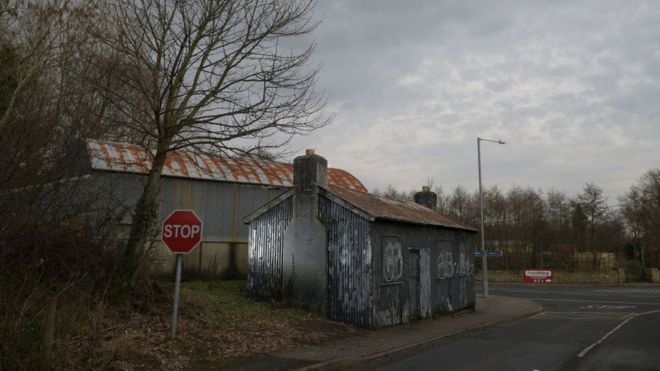 GETTY IMAGES
GETTY IMAGES
Speaking in Dublin, Ms Merkel said: "We will simply have to be able to do this...where there's a will there's a way. We still hope for an orderly Brexit."
But the UK is currently scheduled to leave the European Union (EU) on 12 April unless a further extension to the Brexit negotiating process, known as Article 50, is granted.
That has put a fresh focus on what could happen to the Irish border, if there's no deal.
The UK and Irish governments and the EU have been consistent that, whatever happens, there will be no hardening (ie physical checks) at the border.
But keeping that promise could be challenging.
What's the problem?
If the UK leaves without a deal, it will cease to have a trade deal with the EU.
The EU imposes a range of checks at its borders for countries like this.
There are customs checks, like those on the Norway-Sweden border, and product standard checks.
The checks on food products are strict - they must take place at border inspection posts located "in the immediate vicinity of the point of entry" into the EU.
The EU says these border checks are necessary to protect what it refers to as the "integrity" of its single market and customs union.
Essentially, it means that the EU wants to prevent products entering its market that could be unsafe or represent unfair competition.
The EU's chief negotiator Michel Barnier has repeatedly emphasised that protecting the single market is a key objective for the EU.
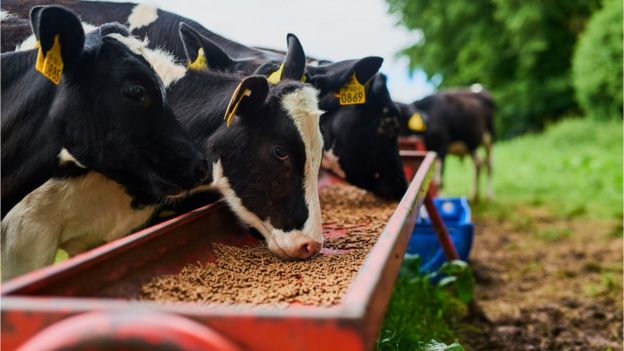 GETTY IMAGES
GETTY IMAGESWhat has the EU said?
The EU has made it increasingly clear that there would have to be some form of checks on cross-border trade in Ireland - but the question is how and where would they take place?
"We have to implement everywhere, at each and every external border of the EU, three types of controls" to protect consumers, businesses and national budgets, says Mr Barnier.
"We need to find the way somewhere to implement the checks. We're working with the Irish government to know where we can apply these checks."
What checks could happen away from the border?
The Revenue Commissioners, Ireland's tax authority, has suggested that while all customs declarations could be filed electronically, up to 8% of consignments would still need to be physically checked for customs purposes.
It says it is exploring ways of doing this at traders' premises or at designated warehouses.
Brexit supporters and some government ministers have seized on suggestions like this to say that there is no real problem.
"Solutions have been come up with that don't involve a hard border, that involve doing checks elsewhere," Liz Truss, the chief secretary to the Treasury, told the BBC.
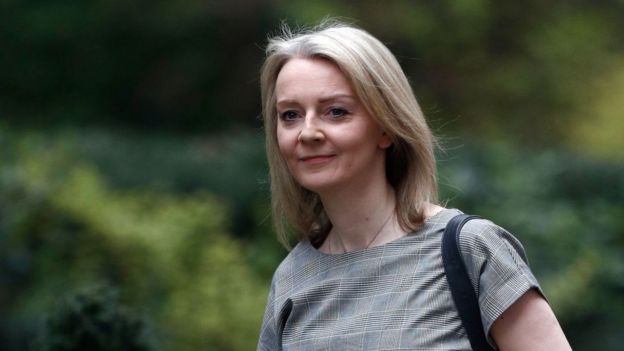 GETTY IMAGES
GETTY IMAGES
However, the EU's strict rules on checking certain food products may prove to be a potential problem, according to the Revenue Commissioners.
On top of that, carrying out checks in warehouses would seem to conflict with the Irish government's definition of a hard border which rules out not only physical infrastructure but also "related checks and controls".
Taoiseach (Irish prime minister) Leo Varadkar has said Ireland will do everything possible to avoid a hard border, but food and animal checks will be difficult to get round.
"Customs duties can be collected as other taxes are, either online or into tax offices... When it comes to animal checks it's much more difficult. Animal checks can only possibly be done physically by vets," he said.
Anna Jerzewska, trade policy consultant at British Chambers of Commerce, agrees that customs formalities can be carried out away from a border but eliminating all checks would be a stretch.
"That would be a massive departure from existing procedures for any country," she said.
"There's a reason borders are not invisible. It ensures some level of compliance and an acceptable level of risk."
She adds that the European Commission would also have to justify to other member states why these procedures could be used in Ireland and not in, say, Bulgaria.
Could checks take place in the Irish Sea?
Leo Varadkar has suggested that this would be the best way to prevent any hardening of the border.
Speaking after a summit of EU leaders last month, he said: "There is a growing acknowledgement that the only way you can avoid a hard border is special arrangements.
"It's the detail of those we need to work through - but if you want to know what they look like, they look like the backstop."
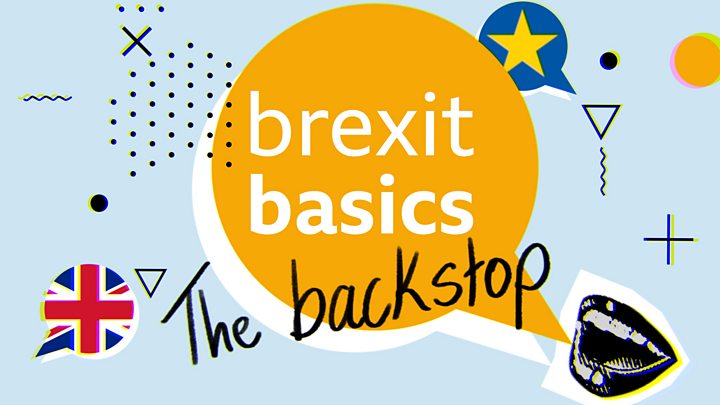
The backstop is the most controversial part of Theresa May's deal with the EU.
It would mean that if a final trade deal was not sufficient to keep the Irish border as it is now, then Northern Ireland would stay aligned to some rules of the EU single market.
That would mean goods coming into Northern Ireland from elsewhere in the UK would need to be checked to see if they meet EU standards.
It would be a huge step for a UK government to implement something like the backstop in the event of no deal.
And the DUP has repeatedly said it is against any new checks on goods coming into Northern Ireland from Great Britain as "that would make us separate from the UK", according to its leader, Arlene Foster.
Instead, the DUP wants alternatives solutions, such as technology, to replace the backstop. But the EU has ruled out using existing technology, saying it would not be enough to remove the need for checks and controls.
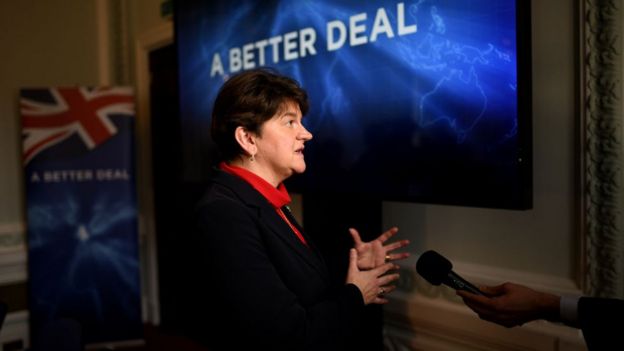 GETTY IMAGES
GETTY IMAGESCould checks take place between Ireland and the EU?
An alternative suggestion is that checks could take place on goods leaving the island of Ireland and destined for the EU.
So, in effect, the border shifts between the island of Ireland and mainland Europe.
French officials have suggested to The Times that no deal would mean checks between Ireland and the EU "if Ireland wants to stay in the EU".
However, the Irish government has made it clear it would resist any such plan.
"Ireland is not going to allow a situation where the UK leaving the European Union without a deal drags Ireland out of the single market with it," said Simon Coveney, Ireland's minister for foreign affairs and trade.
What is the UK government going to do?
The government published its no-deal plan for the border last month.
It has promised not to introduce any new checks or controls on goods, including no customs requirements for nearly all goods.
The plan is intended to be temporary and the government said its priority would be to enter into discussions with the European Commission and the Irish government to jointly agree long-term measures to avoid a hard border.
https://www.bbc.com/news/uk-northern-ireland-47786455